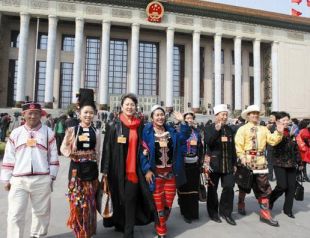CPPCC members
CPPCC members (政协委员) are selected through consultation and recommendation. The Standing Committee decides through consultation on the number of members and the candidates for each CPPCC National Committee after they are examined and approved by the Chair's Council of the preceding CPPCC National Committee.
CPPCC members are personages who represent all areas and sectors of society in China, have social influence and are capable of participating in the deliberation and administration of state affairs.
CPPCC members are required to maintain close ties with the people, to get acquainted with and report the people's desires and demands and to attend meetings and participate in activities organized by the CPPCC committees of which they are members.
CPPCC members enjoy the following democratic rights - the right to vote, elect and stand for election at the sessions of their committees, to make suggestions and criticisms concerning the work of their committees, to fully air their opinions and participate in discussions of national policies and principles and important local affairs at the sessions and through their committees, to make suggestions and criticisms concerning the work of personnel in government departments, to report and expose violations of discipline or laws and participate in the investigations and checks of such violations, to freely declare their resignation from their committees, and request reconsideration if they are subject to the punishment of warning or dismissal from their membership. CPPCC committees shall protect their members’ democratic rights to perform their duties according to the law.
CPPCC members have the duty to abide by and carry out the Charter of the CPPCC and resolutions adopted at the meetings of their committees.
The Eleventh CPPCC National Committee has a total of 2,237 members, of whom 895, or 39.99 percent, are CPC members, and 1,342, or 60.01 percent, non-CPC members. There are 393 women members, accounting for 17.6 percent. There are members representing all China,s 56 ethnic groups. In addition, among the members are leaders from all of China's major religious groups, compatriots from Taiwan, celebrities from all walks of life in Hong Kong and Macao, experts who are Chinese citizens of foreign descent and representative figures of new social strata that are emerging in the process of social change.
